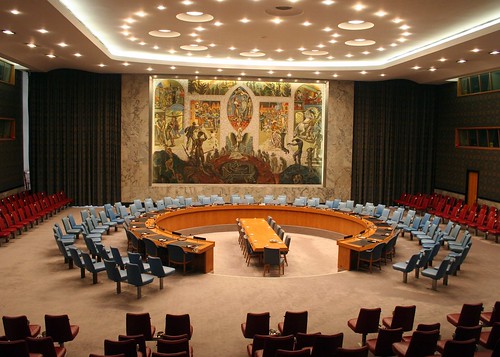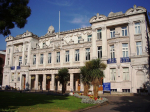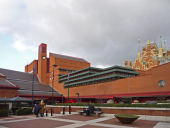
Outrage grew on Sunday after Russia and China blocked a UN Security Council resolution condemning Syria for its crackdown on protests, with the opposition saying it handed the regime a "licence to kill."
Saturday's rare double veto drew swift condemnation from world powers, with Washington saying it was "disgusted."
Russia blamed Western powers for the Security Council's failure to pass the resolution, saying they had failed to make an additional effort for consensus.
"The authors of the draft Syria resolution, unfortunately, did not want to undertake an extra effort and come to a consensus," Deputy Foreign Minister Gennady Gatilov wrote on Twitter.
The failed resolution followed widespread disgust at what the opposition Syrian National Council (SNC) labelled a "massacre" overnight Friday in the central flashpoint city of Homs and a spiralling death toll.
Activists and residents had reported more than 200 civilian deaths, including women and children, during a massive assault by regime forces there.
On the ground, activists on Sunday reported another 60 people killed in Syria, adding to the body count of one of the bloodiest weekends since the uprising against Assad's regime erupted almost 11 months ago.
Opposition groups say at least 6,000 people have now been killed in Syria since last March.
The surge of violence coupled with the second UN double veto in four months triggered a wave of international outrage at the failure to reach a common stand at the United Nations.
The SNC said in a hard-hitting statement that "Syrians and others around the world" had looked to the Security Council to issue a strongly worded resolution.
"The SNC holds both governments accountable for the escalation of killings and genocide, and considers this irresponsible step a licence for the Syrian regime to kill without being held accountable," it said of Russia and China.
US ambassador to the UN Susan Rice said Russia and China "remain steadfast in their willingness to sell out the Syrian people and shield a craven tyrant."
The veto controversy comes ahead of a Tuesday visit to Damascus by Russian Foreign Minister Sergei Lavrov and Russia's Foreign Intelligence Service (SVR) chief Mikhail Fradkov for talks with Assad.
"Russia strongly intends to achieve a rapid stabilisation of the situation in Syria through the rapid implementation of much-needed democratic reforms," the Russian foreign ministry said in a statement Sunday.
"It is with this aim... that Sergei Lavrov (is) visiting Damascus on February 7."
Assad's troops shelled Homs "randomly" overnight Friday, killing men, women and children, the SNC said.
It said at least 260 civilians were killed, while the Syrian Observatory for Human Rights said about 100 women and children were among its toll of the 237 dead.
The authenticity of the figures is difficult to independently confirm because of reporting restrictions imposed on foreign media.
US President Barack Obama denounced what he called an "unspeakable assault."
"Assad must halt his campaign of killing and crimes against his own people now. He must step aside and allow a democratic transition to proceed immediately," Obama said in a statement.
The SNC called the Homs incident "one of the most horrific massacres since the beginning of the uprising in Syria."
Damascus denied responsibility, blaming the deaths on opposition rebels seeking to influence the Security Council debate.
While Russia and China used their diplomatic muscle for the second time in four months to block a resolution condemning the violence, the other 13 countries in the 15-member council voted for it.
The resolution had been proposed by European and Arab nations to give strong backing to an Arab League plan to end the crackdown.
Russia's UN envoy Vitaly Churkin justified the veto by saying the proposed resolution "sent an unbalanced signal to the Syrian parties."
His Chinese counterpart Li Baodong said pushing through such "a vote when parties are still seriously divided... will not help maintain the unity and authority of the Security Council, or help resolve the issue."
Britain is "appalled" at the veto, said its UN ambassador Mark Lyall Grant, while French President Nicolas Sarkozy "strongly deplores" the veto, his office said.
Syrian government mouthpiece Tishrin on Sunday called the veto "a catalyst that will enable Syria to accelerate reforms, organise a referendum on a new constitution, multi-party elections and the formation of a larger government that includes opposition movements."
Western envoys said they had bent over backwards to change the text after Russia balked at any resolution that could be used to justify foreign military intervention, called for Assad to quit or imposed an arms embargo on Syria.
Tunisia on Sunday urged other Arab nations to follow its lead after it said on Saturday it was expelling Syria's ambassador and withdrawing its recognition of the Assad government.
The Syrian Observatory for Human Rights, meanwhile, on Sunday reported 60 more people killed in Syria, including 27 soldiers and six rebels.
Among the dead were 12 civilians killed on Saturday when security forces opened fire in the Damascus suburb of Daraya on mourners attending funerals, the Britain-based rights watchdog said.
It said nine Syrian soldiers died and 21 were wounded in clashes overnight with armed rebels at Jebel Al-Zawiya in Idlib province, which borders Turkey.
The Turkey-based Free Syrian Army, which comprises army deserters and armed volunteers, regularly attacks the security forces in a bid to halt their crackdown on dissent.
AFP, photo: C.Sondergaard








































